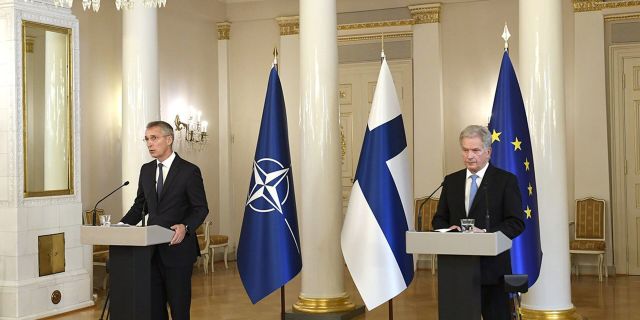Scandinavians, NATO and binding alliances
The accession of Finland and Sweden to NATO will not add to the security of the United States in any way, according to the famous American conservative politician Patrick Buchanan. But there will be more worries and risks: the Finnish border with Russia is 1,270 kilometers. But can the US and the EU miss the opportunity to "punish Putin"?
Last Wednesday, the Prime Ministers of Sweden and Finland, Magdalena Andersson and Sanna Marin, made it clear that their countries are likely to apply for membership in NATO.
The Washington Post welcomed such a "prospect": "Finland and Sweden should join NATO." The editorial was published under the heading "A way to punish Putin."
Before joining the jubilation of NATO capitals, we can analyze what NATO membership of these two Scandinavian countries will mean for the United States.
Finland is a country the size of Germany, which by population is only 4% of Russia. At the same time, the Finnish-Russian border has a length of 1,270 kilometers.
According to article 5 of the NATO treaty, in the event of a Russian attack, the United States will be obliged to go to war with the world's largest nuclear power in order to regain Finnish territories.
Moscow has already threatened that, if the Scandinavians join the alliance, Russia will deploy new nuclear weapons in the Baltic region.
Is it reasonable to officially agree (on an indefinite basis, since NATO is a permanent alliance) to a war with Russia to protect Finland?
The conflict in Ukraine and the accompanying crisis in Eastern Europe are understandable reasons why Stockholm and Helsinki are worried about their security and seek to be under the US nuclear umbrella.
But why should we consciously agree to give Sweden and Finland military guarantees? Why should we commit ourselves to going to war with Putin's Russia — a war that could escalate into a conflict using tactical nuclear weapons, especially if Russia loses?
Finland remained neutral during the Cold War. Sweden has been neutral since the Napoleonic Wars of the early 19th century.
How have we suffered from their neutrality?
Helsinki and Stockholm understand the benefits of the commitment of the United States and NATO to enter the war for Sweden or Finland.
But how do we, the United States, benefit from the promise to fight against a country with the world's largest nuclear weapons reserves because of the conflict in the Baltic Sea or the Gulf of Finland, which does not concern us?
When asked how he feels about the efforts of Sweden and Finland to join NATO, Vladimir Putin's press secretary Dmitry Peskov expressed a warning:
"We have repeatedly said that the alliance is rather a tool sharpened for confrontation. Further expansion of NATO will not bring security to the European continent."
Now, in the event of a collision between Russia and Finland or Sweden, the United States has the freedom to choose whether to react or not, depending on our own assessments of risks and benefits.
Why not leave it as it is? Why should we give up freedom of action in a potential clash with our main opponent?
History teaches us lessons.
In March 1939, six months after the Munich Agreement, according to which Czechoslovakia was divided into ethnic components, Great Britain gave military guarantees to Poland. It was then that the country had disagreements with Germany, which concerned the port city of Danzig, which was taken from the Germans by the allies in the Entente after the victory in the First World War.
It is believed that collective security is a good thing.
However, the basis of NATO's security is US military guarantees, while most of the contributions are made by 29 of our alliance allies, which may become 31 by the summer.
Otto von Bismarck predicted that a great war in Europe would break out "because of some stupidity in the Balkans."
Indeed, the reason for the outbreak of the First World War was the assassination of the Austrian Archduke in Sarajevo in June 1914. The Germans came into conflict partly because the Kaiser gave Austria-Hungary carte blanche for the war.
To stay away from both world wars during the most difficult first years after they began — that's what America's policy of "freedom from binding alliances" allowed then.
But today we are not only at the head of the alliance of 30 countries, but we are adding two more members to it. And one of them has a 1,270-kilometer border with Russia.
How much longer will our luck last?
Patrick Buchanan

